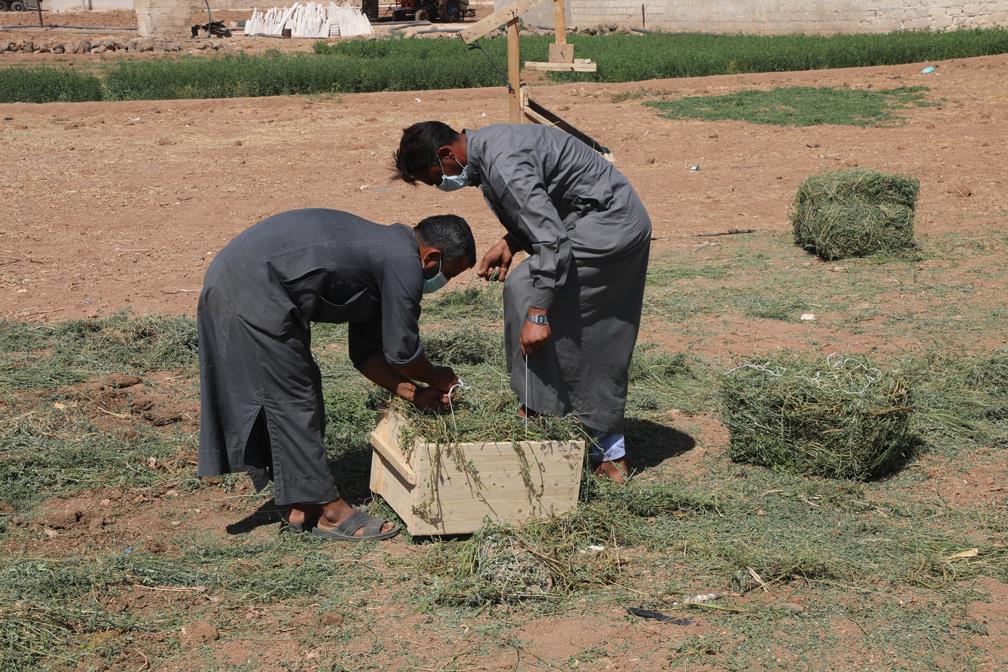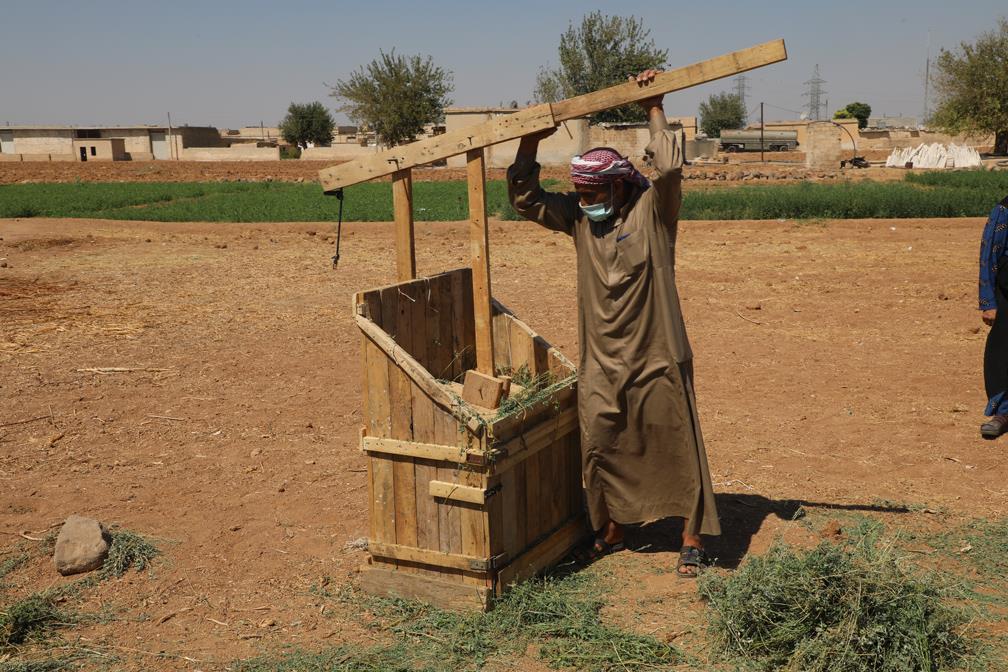
One Syrian gives his community a non-traditional helping hand
A Syrian livestock keeper’s invention helps his neighbours maintain their income for the winter months
After attending an FAO Farmer Field School, Abdullah Bilal Tobal came up with an innovative idea to make a fodder press that would reduce crop loss, maintain his herds’ productivity throughout the year and ultimately improve his livelihood. ©FAO/Andrea Thiodour
26/01/2022
“I'm offering the use of my fodder press free of charge to anyone who needs it,” states Abdullah Bilal Tobal, a smallholder livestock keeper from Tal Hasel in the Aleppo Governorate of northwestern Syria. “If any of my neighbors wants a machine like this, I'd be happy to make it for them.”
Abdullah got an innovative idea after attending one of FAO’s Farmer Field Schools (FFS), where he and other livestock keepers learned how to compress dried alfalfa into bales to preserve it so they can feed their cows in the winter.
“We used to feed our animals with green alfalfa in the summer, and we threw away the surplus when summer ended. At the [Farmer Field] school, we learned how to avoid this loss by harvesting alfalfa every 20 to 30 days, drying it and then compressing it into bales using a hand-held box to store the fodder for the winter season.”
It was from this experience that Abdullah decided to design a tool for compressing fodder. He built a simple prototype of a manual press as an improvement of the fodder preservation method he learned at the FFS. Abdullah’s bale-making technique uses a wooden compressing machine instead of having to press the alfalfa with his own hands and feet, making this process physically easier and less time-consuming.
Abdullah realized that, with less quality fodder available on the market, his press was a chance to improve his livelihood, reduce alfalfa crop loss and maintain his herds’ productivity throughout the year.
FAO’s Smallholder Support Programme (SSP), uses FFSs to reach smallholders across Al-Hasakeh, Aleppo and Deir-ez-Zor governorates and enhance their skills by giving them access to information, as well as supporting their learning through direct practice (learning by doing). Abdullah’s fodder press is just one example of how FFS can open minds to new ways of farming and help improve livelihoods.


Livestock keepers had to join forces to fill, press and bind alfalfa into bales before Abdullah’s fodder press creation (right/bottom). ©FAO/Andrea Thiodour
Not initially convinced
Despite its early promise, some locals were still not convinced with dried alfalfa. They thought it was too much work and insisted on using the green fodder, but Abdullah demonstrated the results in terms of milk production of the preservation technique he learned at FFS. After he also pointed out the time and cost savings, they changed their minds.
“In the short period of using this press, I preserved enough to save a quarter of the cost I would need to buy fodder, but in the future, I will have time to preserve more and save more,” Abdullah elaborates. “Now I have a little over a ton of dried alfalfa stored for the winter. I am using this with a mix of other fodders, which helped me save the cost of buying hay and is nutritionally better for the cows.”
Moreover, the success of his machine is encouraging Abdullah to work on improving it for the benefit of his community. “A few people wanted their own press but could not afford the materials to make it, so I let them use mine for free. I used to work with wood in the past which is why I had the idea to make it out of wood, but there is still room for improvement. It could be made stronger and easier to use with a lightweight metal like aluminum, and there is a possibility to make a mechanical version using a motor which would massively improve its productivity,” he explains.
In total, Abdullah was approached by more than 15 households from his village and the surrounding area to use this press last season, and he expects more people will be interested in the future.

FAO’s FFS combines innovation and best practices to improve farmers’ production and increase their incomes from agriculture. ©FAO/Andrea Thiodour
“Inputs and grants can support crisis-affected farmers in Syria; however, farmers need more if they are to sustain their livelihoods and modernize their agricultural production practices. More than anything, FAO is looking to encourage and develop the attitudes of farming communities to produce competitive products to meet market demands,” says Alfredo Impiglia, FAO Chief Technical Advisor of the SSP.
Farmer Field Schools are an effective way to close the skills gap and reach marginalized and disadvantaged populations, such as youth and women, in rural communities. They help rural populations develop their income-generating potential and establish agriculture-related businesses. This supports self-reliance and increases employment.
The SSP also offers training opportunities in agribusiness establishment and management. This allows farmers and livestock keepers the chance to play a key role in the recovery of the agricultural sector in Syria by gaining skills and innovative coping strategies that help them to become more resilient in times of crisis.
Related links
Learn more

